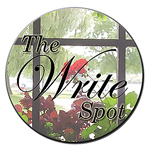show and tell
One of my co-workers asked me this morning if I'd be willing to answer some questions for her daughter, who's taking a high school creative writing class and using one of my books for her report on writing romance. I'm a project! How cool is that?
Q: When you first went to get published, what process did you have to go through, and how long did it take?
A: I've been writing stories and journals ever since I learned to hold a pen, but I'd never thought about actually writing A Book until the characters in one of the stories I was doodling around with suddenly took on lives of their own — or that's how it felt, anyway. They would wake me up at night, doing stuff and having conversations right there in my head ... and they kept right on doing stuff and chattering away until I got up and wrote them down. I finally started keeping a notebook by the bed and carrying a mini tape recorder with me in the car so I wouldn't forget the good bits that always seemed to happen when I wasn't near my computer. It took me just over a year to finish that first book. Then I had to figure out what to do with it.
Writer's Market to the rescue! I researched publishers, figured out who wanted what and learned how to write a query and synopsis. (If you think writing a 70,000 word novel is hard, try re-telling it in a one-page synopsis!) It was early in 1996 when I finally sent those first chapters out into the world of the slush pile.
And then I waited.
The months trudged by.
Waiting is hard.
Rejection letters are harder.
"Dear Writer, Thank you for the opportunity to consider your work. Regretfully, I do not feel that this project is suited to our list. I apologize for the form letter, but with the number of submissions we receive, it is not possible to give a personal response in every case."
"I'm sorry to say this does not sound like something suitable for our list but thank you for thinking of us."
"Thank you for writing me about your novel. I'm sorry to say that it's not fresh enough for our list."
Not fresh enough? Ouch!
But then, in October: "Your query has piqued our interest and we would like to see more. Could you please send in the complete manuscript?"
There followed a hair-pulling weekend of polishing and tweaking and gnashing of teeth — was it as good as it could be? Monday morning I crossed my fingers and mailed it away.
And waited.
Five months later, the big envelope came back. "Unfortunately, after careful consideration we have decided it is not right for our list in the current competitive market."
And I thought to myself ... thank goodness!
Truth is I was relieved. Why? Because by that time I had realized how much I still had to learn about writing. Some bits of that first book, bits that had sounded perfectly wonderful only a year before, now sounded so incredibly dismal I was embarrassed to the point of tears. I put that book away in a box in a dark closet (where it remains to this day) and moved on.
While waiting for all those rejections, I kept busy by taking creative writing classes and workshops on writing for the romance market. I also read a lot of romance novels to try to figure out what made them special. I joined RWA and read their monthly magazine cover-to-cover, learning everything the already-published members were willing to share. (I still learn something new in those pages every month - thank you all!)
Eventually, I got together with a writer friend and the two of us began working on a novel together. We wound up completing two stories in two years and we submitted them to all the big names in romance publishing. At that time, it took anywhere from 3 to 8 months to hear back on a submission. (It takes a lot longer now.)
Both books were eventually turned down by the first round of publishers, but the rejection letters this time were "good" ones. The editors took the time to write personal notes to tell us they liked our writing and explain why they were passing on the stories. We paid attention to every bit of advice, polished the stories up, and submitted again. Avalon Books liked us. (They really liked us!) Rock Solid was released in 1997. Our second novel, Fast Focus, followed later that same year.
My next two books, written solo, each took about a year to complete and were accepted within three months of submission. One for Sorrow, Two for Joy was released first in 1999 and again in 2002 as a large print book. Sparks Fly, a Canadian, north-country, firefighting romance was definitely the most fun to research — I learned to fly a plane!
Q: What made you want to write romance novels as opposed to any other genre?
A: Romance novels are a great way to explore relationships. There's room for lots of emotion as well as humour; and because it's a very broad genre, romances can contain elements of mystery, suspense, fantasy, horror, even science fiction. In other words, it's never boring. And who doesn't love a happy ending?
Q: What is the experience of writing a novel like? Do you have characters and plots in mind ahead of time or do you let things develop as you go along?
A: It's exhausting, exhilarating, frustrating, humbling and always entertaining. I've been known to lose track of time...sit down at the computer after breakfast and look up after what seems like minutes — an hour at most — to discover I've missed both lunch and dinner, the sun has set and I'm still in my pajamas.
When I worked with a co-author, we had to plot out the scenes and chapters to keep ourselves on track. But when I'm writing on my own, I usually start with the characters and a general idea of 'story', then start writing and see what happens. I'm constantly surprised by what comes out of my characters' mouths — that's what makes writing so much fun.
Julia Cameron, author of The Artist's Way, says it best: "I believe that what we want to write wants to be written. I believe that as I have an impulse to create, the something I want to create has an impulse to want to be born. My job, then, is to show up on the page and let that something move through me. In a sense, what wants to be written is none of my business."







 Home of The Write Spot
Home of The Write Spot




0 Comments:
Post a Comment
<< Home